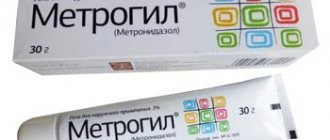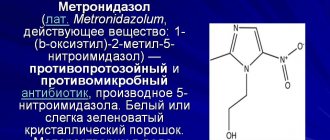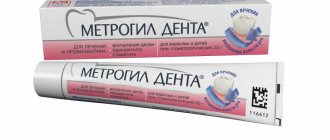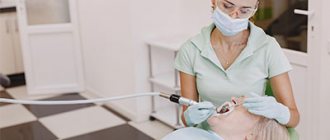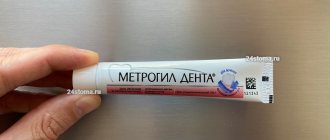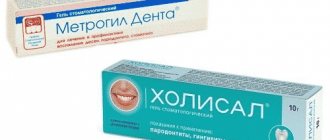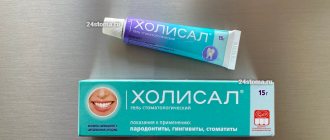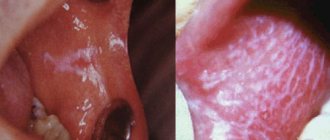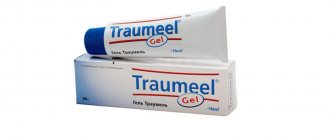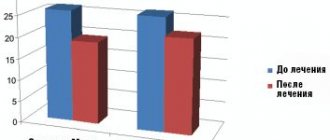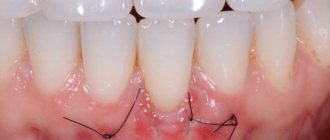Today, dentistry is focused on comprehensive patient care, which begins with diagnosing the oral mucosa and checking the integrity of the teeth. It is important to understand that the oral cavity is not separate from the body, but is capable of influencing key processes in the human body.
That is why during a modern dental appointment the doctor pays attention to the study of all systems of the human body. An indicator of pathological processes in organ systems is, first of all, the oral mucosa. If her condition deviates from the norm, then you first need to understand what caused it, and then take appropriate measures. For this reason, Taisiya Tereshchenko, a dentist of the highest category, spoke specifically for apteka24.ua about how to monitor the health of the oral mucosa and why Metrogyl Denta is needed.
Metrogyl gel is a reliable product in dentistry
Metrogyl Denta is a dental medicinal product produced by pharmaceutical companies in the form of a gel. Thanks to the combined composition, including:
- antibiotic;
- antiseptic,
- the medicine has a wide spectrum of antimicrobial action and is recommended by experts for use by both adults and children over 6 years of age.
The main active ingredients of the drug are metronidazole and chlorhexidine.
Metronidazole, known for its antimicrobial properties, is successfully used in medicine for:
- peptic ulcers;
- chronic colitis;
- inflammation of the urinary system;
- genital infections,
- as well as for the purpose of preventing complications that often arise after surgery.
Chlorhexidine is an effective antiseptic used in medical practice:
- during preoperative treatment of hands;
- when cleaning medical premises;
- for disinfection of instruments.
Thanks to its gel consistency, Metrogyl is successfully used in dentistry, but in addition, the product can help solve some cosmetic problems and stop the inflammatory processes of the external genitalia.
Metrogil:
instructions for use
In dental practice, the drug is used to treat:
- gingivitis;
- periodontitis;
- bacterial stomatitis;
- lip inflammation;
- inflammatory processes of the hoods over wisdom teeth;
- inflammation of the mucous membrane;
- alviolite of the socket of an extracted tooth,
- It is also used as an additional agent in the treatment of periodontitis and periodontal abscess.
However, despite the effectiveness of Metrogyl, the instructions of which recommend its use for these diseases, an experienced doctor may prescribe other drugs, depending on the individual characteristics of the patient’s body and the complexity of the case.
Metrogyl denta goes on sale in laminated plastic tubes of 20 grams and is sold without a prescription.
Metrogyl, reviews of which from experts allow us to recommend to patients a relatively inexpensive and effective antiseptic drug, is often used as an everyday means of oral hygiene, which helps prevent many inflammatory processes.
What do the two gels have in common?
All forms of release have a similar broad antimicrobial range of action . The drugs destroy protozoa - the causative agents of trichomoniasis, amoebiasis, giardiasis. Infections caused by rod-shaped microorganisms - bacteroides, fusobacteria, clostridia, peptococci, peptostreptococci - are highly sensitive to therapy with these drugs.
A number of researchers talk about the presence of antioxidant properties, that is, the drug prevents tissue damage from free oxygen molecules.
Application benefits
Despite the rather low concentration of active substances and the lack of analgesic effect, Metrogyl Denta gel has a number of advantages over more modern drugs used in medicine, for example:
- the drug is perfectly fixed on the mucous membranes;
- has a fairly high efficiency,
- In addition, its affordable cost allows you to regularly use this product for preventive purposes.
The active components of the drug allow you to influence pathogenic microorganisms, but are not able to block mediators of inflammatory processes in tissues, therefore, in the treatment of many diseases, experts recommend combined procedures to achieve a more effective result.
Defects of the oral mucosa and what they may indicate
There may be several reasons for such changes, but only a qualified doctor can determine what is wrong and make an accurate diagnosis.
Changes in the mucous membrane may indicate pathology:
- gastrointestinal tract;
- immune system;
- endocrine system;
- general intoxication of the body.
As a result, defects appear on the surface of the oral mucosa - ulcers and erosions. All these elements of the lesion cause discomfort to the patient.
In this case, consultation with a specialist is necessary - a therapist, gastroenterologist and endocrinologist.
But defects in the mucous membrane are often very painful and interfere with normal nutrition and speech in everyday life. In this case, healing and local anesthetic agents for local use are necessary. One of such effective drugs is Metrogyl Denta.
Metrogyl Denta for stomatitis
Stomatitis is a fairly common pathology of the mucous membrane, occurring in both adult patients and children, however, Metrogyl is effective only for bacterial forms of the disease and when diagnosing them, the drug allows for healing.
To heal ulcers, in these cases, applications are recommended, but the drug is absolutely ineffective for stomatitis caused by viruses.
When treating gums, the drug is applied to the affected areas of the mucous membranes, for example, using cotton swabs. The course of treatment for stomatitis lasts for 7-10 days, procedures are carried out 2-3 times a day.
Alviolite therapy involves placing a small amount of gel into the inflamed hole.
When teething through wisdom teeth, it is recommended to use the drug as a toothpaste, applying the product to the inflamed gums. In this case, using a toothbrush with gel, both teeth and gums are treated, but you should refrain from eating and drinking for half an hour so that a protective film is formed that will protect the oral cavity from pathogenic microorganisms.
Indications for use of dental gels
The dentist may prescribe the gel to a child or adult when there are signs of gum inflammation. The reason for using the gel will also be stomatitis, which affects not only the gums, but also the entire oral mucosa.
Dental gel will help with the following symptoms and diseases:
- pain, burning, redness along the edge of the tooth crown;
- bleeding gums after chewing hard foods and brushing teeth;
- thrush, fungal stomatitis or oral candidiasis;
- glossitis (inflammation of the tongue) and papillitis (inflammation of the dental papilla);
- teething in a child;
- growth of wisdom teeth, which is accompanied by gum damage.
The medicine can only be used topically. The gel is applied to the affected areas of the mucous membrane up to 4 times a day, according to the instructions. After treating the gums, it is recommended not to eat anything for several hours, and not to drink for at least half an hour, so as not to wash off the drug. Before applying, be sure to rinse your mouth with an antiseptic or regular mouthwash.
Some types of gels are homeopathic remedies, therefore, in case of severe inflammation and pain they will be ineffective (Malavit), others have a strong anti-inflammatory and analgesic effect. There is a large selection of dental gels; it is important to understand how they differ, and which one is better for a particular problem.
Features of use
The use of Metrogil Dent gel, especially in the initial stages of treatment, can cause bleeding gums, increased swelling and burning. Such symptoms may appear within a few days, but if they continue, you should stop using the drug.
Despite the fact that no obvious contraindications or side effects have been identified for the drug, Metrogyl is not recommended for use for the treatment of:
- children under 6 years of age;
- women in the first trimester of pregnancy,
- In addition, it is not advisable to use the drug while breastfeeding and, if it is necessary to use it, you will have to stop breastfeeding.
Many experts recommend avoiding drinking alcohol during treatment with Metrogyl gel, since it contains an antibiotic that can be absorbed into the blood, even when applying applications.
In addition, the use of the drug should be discontinued at the first signs of intolerance to the drug.
Studies have shown a negative effect of the drug when taken together with anticoagulants, since the active substances of Metrogyl can enhance their effect, which can cause bleeding.
Experts recommend careful use of the drug, since, for example, swallowing the gel can have serious consequences:
- nausea;
- dizziness,
- which is facilitated by metronidazope, which is part of the product.
Similar drugs:
- Augmentin Oral tablets
- Tea tree DN Ointment for external use
- Augmentin Powder for suspension for oral administration
- Bactrim Oral suspension
- Dioxydin Mouth rinse solution
- Pancef Oral tablets
- Nifuroxazide (Nifuroxazide) Oral tablets
- Cifran OD Oral tablets
- Pancef Granules for the preparation of suspension for oral administration
- Augmentin ES Powder for oral solution
** The Drug Directory is intended for informational purposes only. For more complete information, please refer to the manufacturer's instructions. Do not self-medicate; Before starting to use the drug Metrogyl Denta, you should consult a doctor. EUROLAB is not responsible for the consequences caused by the use of information posted on the portal. Any information on the site does not replace medical advice and cannot serve as a guarantee of the positive effect of the drug.
Are you interested in the drug Metrogyl Denta? Do you want to know more detailed information or do you need a doctor's examination? Or do you need an inspection? You can make an appointment with a doctor - the Euro lab is always at your service! The best doctors will examine you, advise you, provide the necessary assistance and make a diagnosis. You can also call a doctor at home . Euro lab clinic is open for you around the clock.
** Attention! The information presented in this medication guide is intended for medical professionals and should not be used as a basis for self-medication. The description of the drug Metrogyl Denta is provided for informational purposes and is not intended for prescribing treatment without the participation of a doctor. Patients need to consult a specialist!
If you are interested in any other drugs and medications, their descriptions and instructions for use, information about the composition and form of release, indications for use and side effects, methods of use, prices and reviews of drugs, or you have any other questions and suggestions - write to us, we will definitely try to help you.
Contraindications and side effects
In some cases the gel cannot be used:
- individual sensitivity to any component of the drug;
- blood diseases, including in the past observation;
- pathologies of the central and peripheral nervous system;
- children up to 17 years old inclusive.
During pregnancy and lactation, the use of the gel is allowed with caution. A preliminary consultation with a doctor is recommended. Admission is carried out only if the expected benefit is greater than the potential risks.
When taking the drug, skin rashes, itching, headaches, redness, hives and other allergic reactions are possible. In this case, it is recommended to stop treatment and consult a specialist for advice. You may need to change the drug.
Pharmacodynamics
The drug has a combined effect, since it contains 2 active components with an antibacterial effect:
- Chlorhexidine acts on a wide class of gram-negative and gram-positive bacteria. At the same time, it does not inhibit the vital activity of beneficial lactobacilli.
- Metronidazole destroys bacteria that live in an oxygen environment, i.e. aerobic microorganisms. They are the ones that cause periodontal disease.
The gel is used topically, so its active components are practically not absorbed through the walls of blood vessels and do not enter the bloodstream.
